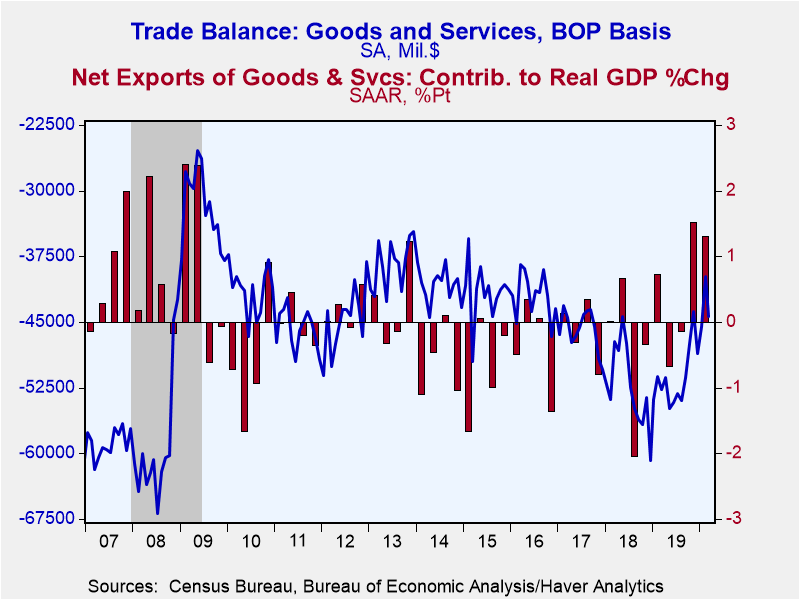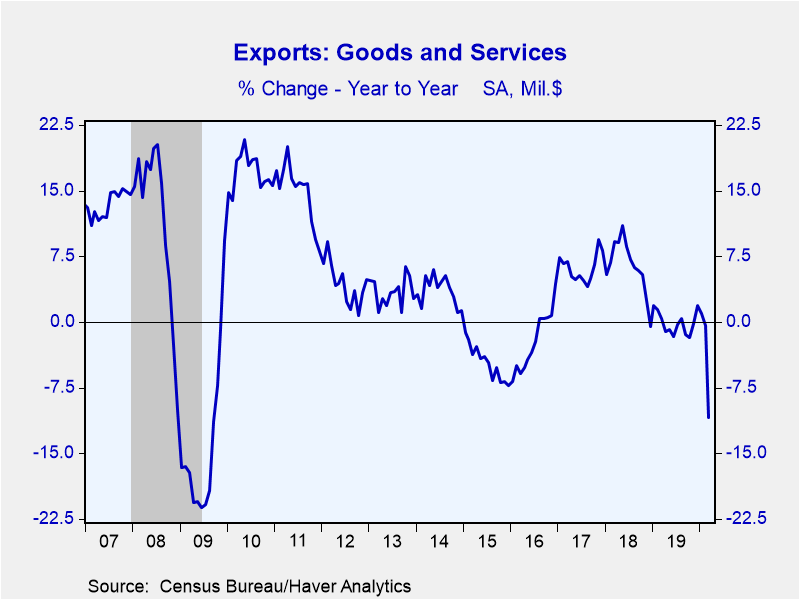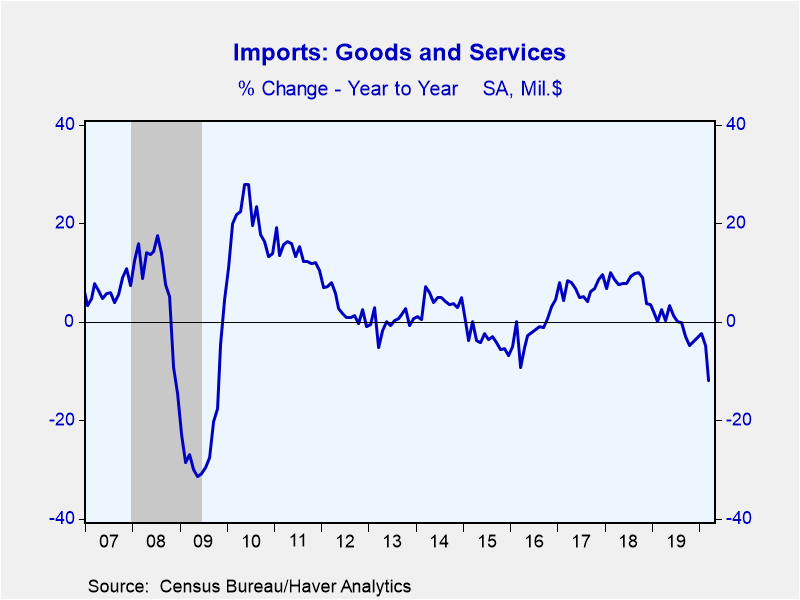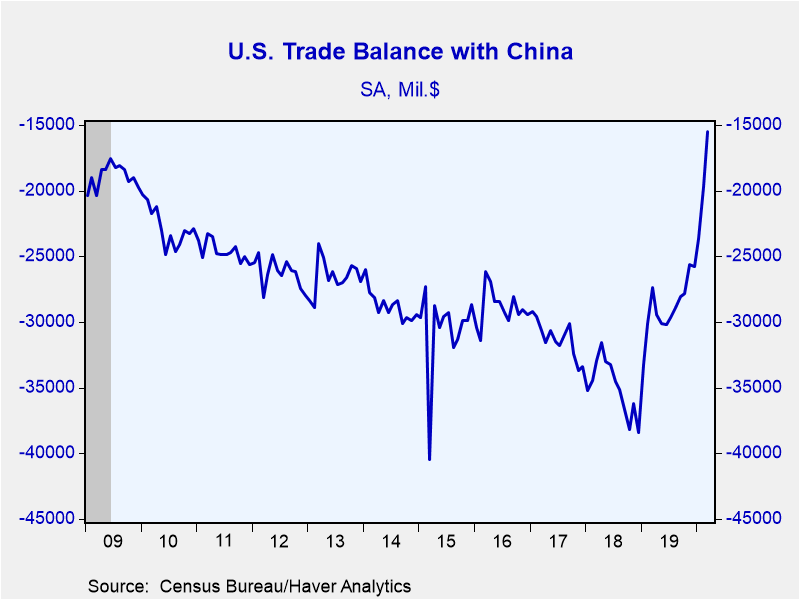 Global| May 05 2020
Global| May 05 2020U.S. Trade Deficit Deepens as Exports Fall in March
by:Tom Moeller
|in:Economy in Brief
Summary
• The foreign trade deficit in goods & services reversed most of its earlier improvement. • Exports declined as growth abroad remained weak. • Imports fell sharply with lower oil prices. The U.S. trade deficit in goods and services [...]
• The foreign trade deficit in goods & services reversed most of its earlier improvement.
• Exports declined as growth abroad remained weak.
• Imports fell sharply with lower oil prices.
The U.S. trade deficit in goods and services increased to $44.42 billion during March from $39.81 billion in February, revised from $39.93 billion. A $44.1 billion deficit had been expected in the Action Economics Forecast Survey. Exports declined 9.6% (-10.9% y/y) after a 0.3% February easing. Imports fell 6.2% (-11.9% y/y), down for the third straight month.
The trade deficit in goods deepened to $65.6 billion last month as goods exports fell 6.5% (-8.6% y/y). Auto exports declined 17.9% (-18.9% y/y) and nonauto consumer goods exports fell 5.2% (-15.6% y/y). Imports of goods fell 2.1% (-9.4% y/y). Petroleum imports fell 21.9% (-29.7% y/y) as the price of crude oil fell to $34.94 per barrel. Nonpetroleum imports eased 0.5% (-7.6% y/y). Capital goods imports rose 2.9% (-7.2% y/y) but nonauto consumer goods imports weakened 7.7% (-14.4% y/y).
The services trade surplus was little changed at $21.18 billion and has been fairly stable for a year. A 15.3% decline (-14.8% y/y) in exports reflected a 45.3% collapse (-50.1% y/y) in travel which was accompanied by a 3.9% drop (-2.0% y/y) in charges for intellectual property. Imports of services declined 21.8% (-22.2% y/y) reflecting a 63.8% weakening (-65.4% y/y) in travel imports with travel restrictions imposed as early as January 31, 2020. Intellectual property imports rose 0.2% (3.1% y/y) in March.
The goods trade deficit with China narrowed sharply to $15.5 billion (SA) in March. U.S. exports to China fell 23.8% y/y while imports fell 37.9% y/y. The trade deficit with the European Union deepened significantly to $16.9 billion (SA). Exports to the EU were off 20.5% y/y while imports weakened 11.0% y/y. The trade deficit with Japan fell to $4.6 billion (SA) as exports to Japan rose 6.7% y/y while imports from Japan fell 8.5% y/y.
The international trade data can be found in Haver's USECON database. Detailed figures on international trade are available in the USINT database. The expectations figures are from the Action Economics Forecast Survey, which is carried in AS1REPNA.
| Foreign Trade in Goods & Services (Current $) | Mar | Feb | Jan | Mar Y/Y | 2019 | 2018 | 2017 |
|---|---|---|---|---|---|---|---|
| U.S. Trade Deficit ($ bil.) | 44.42 | 39.81 | 45.48 | 52.7 (3/19) |
616.43 | 627.68 | 550.12 |
| Exports of Goods & Services (% Chg) | -9.6 | -0.3 | -0.6 | -10.9 | -0.1 | 6.3 | 6.2 |
| Imports of Goods & Services (% Chg) | -6.2 | -2.5 | -1.7 | -11.9 | -0.5 | 7.8 | 6.8 |
| Petroleum (% Chg) | -21.9 | -1.3 | -7.8 | -29.7 | -14.0 | 20.8 | 27.2 |
| Nonpetroleum Goods (% Chg) | -0.5 | -2.7 | -1.4 | -7.6 | -0.5 | 7.5 | 5.5 |
Tom Moeller
AuthorMore in Author Profile »Prior to joining Haver Analytics in 2000, Mr. Moeller worked as the Economist at Chancellor Capital Management from 1985 to 1999. There, he developed comprehensive economic forecasts and interpreted economic data for equity and fixed income portfolio managers. Also at Chancellor, Mr. Moeller worked as an equity analyst and was responsible for researching and rating companies in the economically sensitive automobile and housing industries for investment in Chancellor’s equity portfolio. Prior to joining Chancellor, Mr. Moeller was an Economist at Citibank from 1979 to 1984. He also analyzed pricing behavior in the metals industry for the Council on Wage and Price Stability in Washington, D.C. In 1999, Mr. Moeller received the award for most accurate forecast from the Forecasters' Club of New York. From 1990 to 1992 he was President of the New York Association for Business Economists. Mr. Moeller earned an M.B.A. in Finance from Fordham University, where he graduated in 1987. He holds a Bachelor of Arts in Economics from George Washington University.
More Economy in Brief
 Global| Feb 05 2026
Global| Feb 05 2026Charts of the Week: Balanced Policy, Resilient Data and AI Narratives
by:Andrew Cates










